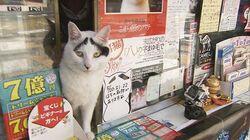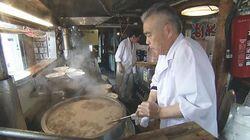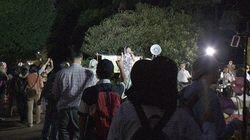Document 72 Hours - Season 3 / Year 2015

Season 3 / Year 2015

Episodes

The Ameyoko International Food Market
Underneath the lively Ameyoko Market in Tokyo's central district of Ueno is a far less well known below-ground market for foreign foodstuffs. Follow the scent of exotic spices down to that basement floor, and you'll hear a rich mixture of Japanese, Chinese, Tagalog, English.... Then you'll see Shanghai Crab, frogs, mysterious fish and unusual vegetables. It all started 3 decades ago with a single vendor of Chinese foodstuffs; now it's greatly expanded. The customers are 90% foreigners. We get a glimpse into the expatriate life of foreigners in Japan, longing for a taste of home.

General Hospital Store: Where Shopping Meets Healing
In southern Chiba Prefecture, a 24-hour convenience store opened three years ago in a huge general hospital. It offers everything from reduced-sugar snacks to loose clothing, and it's busy all the time. One young customer narrowly escaped death. Another patient comes first thing in the morning to buy a newspaper. Doctors working late at night slip in between surgeries to buy instant noodles. Get a unique look at the human condition in this "oasis" at a hospital isolated from our everyday lives.

Dreams Along the Yamanote Line
The Yamanote Line is Japan's most famous loop line. In the blink of an eye, you are whisked to the next station, where yet another distinct side of Tokyo is unveiled. In recent times, an increasing number of people have walked or cycled along the Yamanote Line tracks to experience the diversity of the city. In this program, we spend 3 days walking along the entire 35-kilometer line. What dreams do people have as they live their everyday lives? We met various people - including aspiring singers, foreign students and a plumber - along the line and recorded the "real" Tokyo of today.

Lost and Found in Nagoya: Left Behind on a Holy Night
At Christmastime in Sakae, a busy district of Nagoya, people are rushing to an unexpected place: the lost and found office, where items left on buses and subways are collected. Each year more than 100,000 articles are turned in, ranging from the usual umbrellas and gloves to the amazing, like dentures and wooden grave tablets. The office's storage is awash with items forgotten by Christmas shoppers and year-end partygoers. Who will retrieve them? Hear some of the stories behind the lost articles.

A Discounted Ticket to Happiness

A Standing Oden Bar in Tokyo
The Akabane region of Tokyo is a "sacred ground" for drinking, with inexpensive bars and pubs lining the streets. On one corner stands a small shop that serves oden, a winter stew that's a Japanese soul food. From security guards finishing their night shifts, to mothers buying dinner to take home for their families, to office workers enjoying a night on the town - these are the stories of the people who line up at the counter and washes down oden with sake for warmth from the winter chill.

A Taste of Home: A Soba & Udon Vending Machine
For 40 years, a vending machine has stood in a quiet corner of Akita Port, in northern Japan. Even when a winter snowstorm batters the area in mid-January, a constant trickle of customers is drawn to this time-worn machine that sells plain soba and udon noodles in a steaming-hot soup. A father and son out in the blizzard; a designated driver on his way home from work; and a cancer patient reminiscing about the past. Even though the machine has become prone to breakdowns that have weakened the flavor of its soup, customers come around the clock for a warming bowl of noodles.

A Driving School: The Start of Many Journeys

Tokyo Capsule Hotel: Encapsulating Life
Capsule hotels have quite suddenly become a popular choice of accommodation nowadays in Japan. Travelers from around the world have become fascinated with capsule hotels as word gets around about their low prices and the novelty of staying in a small cave-like "room". At one major capsule hotel in Shinjuku, Tokyo, languages from every corner of the globe ring out each day. Convenience is not the only reason tourists and locals come to this hotel. Some people stay here while they chase their dreams; others need a place to stay because they cannot go home for certain reasons. For 3 days, we filmed the myriad of people that converge in this remarkable facility, and discovered the diverse life stories that inspired them to stay in its tiny capsule rooms.

A Used Car, A New Life

Yakushima: Island of the Mystical Tree

A Kebab Restaurant in Roppongi

A Drive-in Restaurant in Okinawa: Hometown Flavor, American Style

The Lucky Cat at the Shop
At a little shop in Ibaraki Prefecture, there's a goofy but adorable cat with thick black "eyebrows". She's called Hachi for her distinctive marks that resemble the Chinese character "8". That's a lucky number, so customers always come to buy lottery tickets and make wishes for anything from big jackpots to good test scores. All the while Hachi pays them no mind, sleeping on a bookshelf or hiding behind the counter. We spent 3 days talking to the many visitors who make wishes on this lucky cat.

Tonkotsu Ramen Restaurant: Bowls for the Soul

Japan's Northernmost Bus Stop

Voices in Front of the Diet
Streets in front of the National Diet Building are the stage for numerous protests. People opposed to national security bills and nuclear power, among other causes, assemble to express their views in Japan's political nerve center, which decides the nation's future and is home to the Prime Minister's Office, lawmakers' offices and central government agencies. The Diet Building has also become a popular tourist spot and a magnet for visitors and students on school excursions, and the nearby tree-lined streets also attract joggers and Tokyoites walking their dogs. For 3 days and nights in September, as deliberations on the security bills neared completion, we filmed the people on the streets around the Diet.

An Iconic Hotel: Until We Meet Again
Recently Updated Shows

The Amazing Race Canada
The Amazing Race Canada will provide a uniquely Canadian take on the original series, with competitors discovering the world within the borders of Canada.

MasterChef Australia
MasterChef Australia is an Australian competitive cooking game show consisting of a group of hopeful contestants that cook and present food to judges in order to win the title of MasterChef Australia.

The 1% Club
The 1% Club is a unique, compelling and funny entertainment show that tests the nation's intelligence, based on a scientific survey. It's a chance to test how your brain works through a series of questions that all have a right answer but can also lead to a series of entertaining wrong answers along the way. Whether you're a contestant vying for the cash prize or a viewer playing with your friends and family on the app, answer enough questions correctly, and you could earn yourself a place in the 1% Club: an elite group of people who can honestly say they've outwitted 99% of the population.

The Snake
The Snake will follow 15 people from various professions trying to manipulate their way to becoming that week's snake, who decides who stays and who leaves the show, through a series of challenges. Each week, the winner of each challenge earns control of ‘The Saving Ceremony', an elimination that is about who will save certain contestants with people making friends, faking friends, or sparking romantic connections with the winner taking home $100,000.

Dark Winds
Based on the iconic Leaphorn & Chee book series by Tony Hillerman, Dark Winds is a psychological thriller that follows two Navajo police officers in the 1970s Southwest, as their search for clues in a grisly double murder case forces them to challenge their own spiritual beliefs and come to terms with the trauma of their pasts.